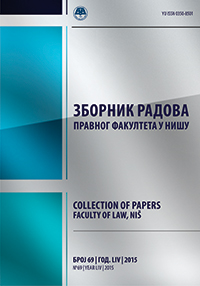ЛЕГИТИМИТЕТ ВИДОВДАНСКОГ УСТАВА
И ОДНОСИ ЊИМЕ УСПОСТАВЉЕНИ
LEGITIMACY OF THE VIDOVDAN CONSTITUTION AND
RELATIONSHIPS ESTABLISHED THEREBY
Author(s): Sava AksićSubject(s): Law, Constitution, Jurisprudence
Published by: Правни факултет Универзитета у Нишу
Keywords: Kingdom of Serbs; Croats and Slovenians; Vidovdan Constitution; power; King
Summary/Abstract: The Vidovdan Constitution (1921) was the first constitution of the Kingdom of Serbs, Croats and Slovenians. Serbian ruling parties advocated that the constitution should be adopted in Parliament by a simple majority vote of Serbs, Croats and Slovenians all together, considering that it was to be the constitution of “one nation with three names”. On the other hand, Croatian and Slovenian parties took the position that the constitution should be approved by a majority vote of each of the three nations (Serbs, Croats and Slovenians) separately. The Constitution was adopted on Vidovdan (St. Vitus Day), on 28th June 1921, by the Serbian and Muslim majority. However, this constitution was not legitimate, because the provisions it rested on were not approved by the parliamentary majority of each nation separately but by the parliamentary majority of all nations together, where the three nations had unequal number of representative. Under the Vidovdan Constitution, the territory of the state was centralized, church authorities did not have the status of state authority, and the Church was only acknowledged the status of an autonomous organization. This Constitution established constitutional monarchy as a form of government. It further envisaged that the King did not have any authorities outside the Constitution, and that there were no authorities that could not be taken away from him under the Constitution.
Journal: Зборник радова Правног факултета у Нишу
- Issue Year: LV/2016
- Issue No: 73
- Page Range: 105-116
- Page Count: 12
- Language: Serbian

